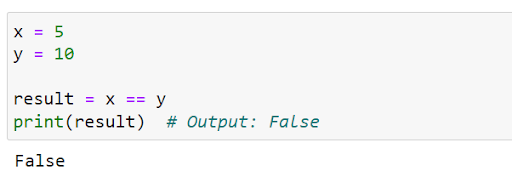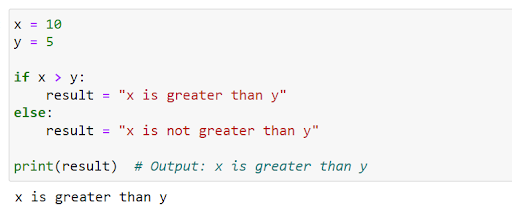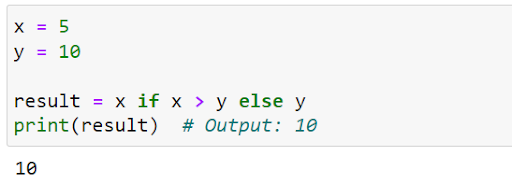What are comparisons and assignments?
Published by
sanya sanya
Introduction:
In Python, comparison and assignment operators are fundamental tools for manipulating variables and making decisions based on conditions. While both types of operators involve variables and values, they serve different purposes. In this detailed blog post, we will explore comparison and assignment operators, explain their functionalities, and highlight the key differences between them. Through well-explained examples, we will solidify our understanding of these essential operators.
# Comparison Operators:
Comparison operators are used to compare values and variables. They return boolean values (True or False) based on the comparison result. Python provides several comparison operators, including ==, !=, >, <, >=, and <=. Let's examine each operator with examples:
**Example 1: The `==` operator (equality)**

In this example, the `==` operator compares the values of `x` and `y`. Since `x` is not equal to `y`, the result is `False`.
**Example 2: The `>` operator (greater than)**

Here, the `>` operator compares `age` with `18`. As `age` is greater than `18`, the result is `True`.
# Assignment Operator:
Assignment operators are used to assign values to variables. They enable us to store and update data in variables. In Python, the most basic assignment operator is =. Let's explore some examples:
**Example 1:**

In this example, the value `5` is assigned to the variable `x` using the `=` operator.
**Example 2:**

Here, the string value `"Alice"` is assigned to the variable `name`.
# The Difference:
While comparison operators are used to compare values and return boolean results, assignment operators are used to assign values to variables. The key differences between comparison and assignment operators are as follows:
-
Purpose: Comparison operators compare values and determine their relationship (equality, greater than, less than, etc.). Assignment operators assign values to variables.
-
Evaluation: Comparison operators evaluate expressions and return boolean results (
TrueorFalse). Assignment operators simply assign values to variables without returning any specific result. -
Syntax: Comparison operators use specific symbols (
==,!=,>,<,>=,<=) to compare values. Assignment operators use the=symbol to assign values. -
Usage: Comparison operators are commonly used in conditional statements (
if,while, etc.) and logical operations. Assignment operators are used when storing and updating values in variables.
**Example:**

In this example, we use the comparison operator (`>`) to compare the values of `x` and `y` within an `if` statement. The assignment operator (`=`) assigns the appropriate string to the variable `result` based on the comparison result.
Conclusion:
Comparison and assignment operators serve distinct purposes in Python. Comparison operators allow us to compare values and determine relationships, while assignment operators assign values to variables. Understanding the differences between these operators is crucial for writing effective and meaningful code that involves decision-making and data manipulation.
Comparison operators evaluate expressions and return Boolean values (True or False) based on the comparison result. They are commonly used in conditional statements (if, while, etc.) and logical operations to control the flow of the program. On the other hand, assignment operators are used to assign values to variables, allowing us to store and update data within the program.
It's important to note that comparison operators can be used within assignment statements to make assignments based on certain conditions. This combines the functionality of both types of operators. Let's see an example:
**Example:**

In this example, we use the comparison operator (`>`) within the assignment statement. If `x` is greater than `y`, the value of `x` is assigned to `result`; otherwise, the value of `y` is assigned. Here, the result is `10` because `x` is not greater than `y`.
To summarize, comparison operators compare values and return Boolean results, while assignment operators assign values to variables. Comparison operators are used for decision-making and comparisons, while assignment operators are used for data storage and updates.
Understanding the difference between comparison and assignment operators is crucial for writing effective code that involves decision-making, data manipulation, and variable assignment. By utilizing these operators correctly, you can create logical and efficient programs that perform computations and make informed decisions based on the conditions at hand.
Library
WEB DEVELOPMENT
FAANG QUESTIONS
On this page
Introduction:
Conclusion:

